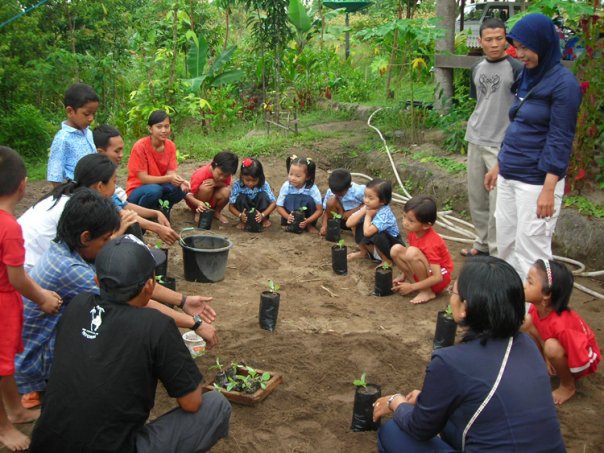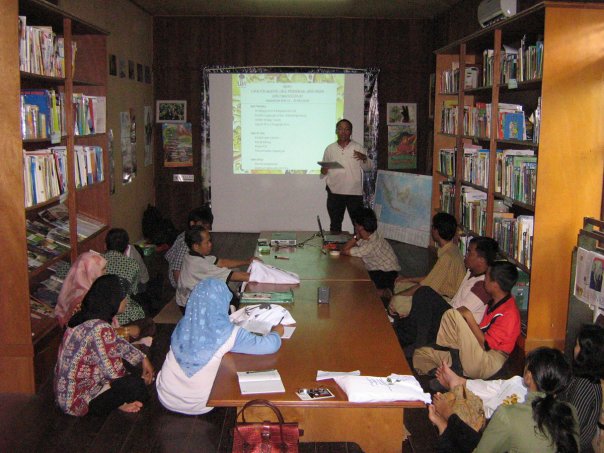Education continues to be highly important to Orangutan Foundation which is why we are exceptionally proud to be supporting an innovative project that appeals to both children and adults on the outskirts of Pangkalan Bun. Here, Yayorin (our long term Indonesian partners) have established their Conservation Village or Kampung Konservasi, a large, dynamic environmental education complex. There is a covered outdoor learning centre (made from coconut trees), alternative agricultural demonstration plots, fish ponds, a nursery, medicinal plant garden, a small children’s camping ground and composting facility.

The fantastic news is that having funded Kampung Konservasi from it's inception in 2006, through to 2012, the project is now sustainable. Funding the Foundation receives can go on to develop Yayorin's work based outside of Kampung Konservasi. This sustainability shows how much the local communities needed and now highly value Yoyorin's resources and outreach.
Yayorin run three integrated programmes based around Kampung Konservasi: Conservation Education, Alternative Agriculture and Sustainable Fish Farming. The Conservation Education Programme incorporates the library, puppet shows, theatre, field trips, school partnerships and extra curricular activities. There have been many visits from local schools where they grasp concepts such as rubbish recycling and they are encouraged to decorate the theatre with “hope leaves” with well wishes to the surrounding environment.
The Alternative Agriculture programme has introduced concepts such as basic agriculture using the demonstration plots reflecting Yayorin’s commitment to finding alternatives to current traditional farming methods which are still essentially based around slash and burn agriculture.
Small-scale vegetable production (their tomatoes have proved incredibly popular!) and full-scale sustainable agriculture have been developed. There is also an Aquaponic Demonstration Plot introduced following a visit to a Sumatran NGO project. Two fishponds pump nutrient-rich fish water from the fishponds into an organic plant bed where plants/vegetables extract the nutrients from the water. Then the water, cleared from excessive nutrients and freshly oxygenated, drains back into the fishpond. Some claimed fish could not be farmed in acidic peat-swamp water, however, these fish are growing fast. As Kampung Konservasi’s manager, Sally Tirtadihardja, says, “One of our biggest successes has been proving people wrong!”
Funded by various groups, Kampung Konservasi support the implementation of educational activities and facilitate the provision of learning activities and the environment and sustainable agriculture. In the period from January to May 2012, Kampung Konservasi created strategies to optimize the learning environment as an arena so that more people receive the benefits of this project. Relationships with local universities in Pangkalan Bun, a forum and invite students from schools assisted or not to discuss and address many areas of conservation, to enable more regular classes with a fresh approach to learning methods, as a speaker at one of the agencies local government, as in activities of the cadre West Kotawaringin Environment Body and Adiwiyata School (School-based environment) held West Kotawaringin Environment Body.
We can't wait to hear what Yayorin get up to next at Kampung Konservasi !






